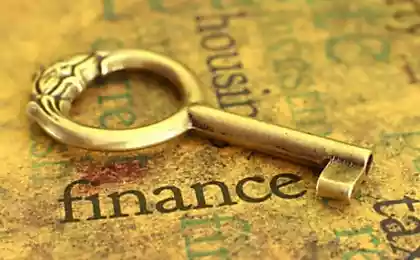952
If you have any habits that threaten your financial well-being
Bad habits of handling money and advice on how to get rid of them.

If you have any habits that threaten your financial well-being (from mindless and useless expenditures to late payment of bills) - this alarm. Below you will find expert advice that will determine how reasonable you handle money and help cope with the shortcomings, if you still obnaruzhatsya.
1. You buy a daily take-away ... as well as coffee and snacks
If you live or work in the city (or your daily route passes through five different auto-cafe), then buy lunch to take away seductively easy - and fraught with problems, if your habit begins to absorb the money that you have planned to save money on something else ... for example, on vacation in the Caribbean.
"There is nothing wrong in buying lunch or a snack on the go, - said the director of financial planning at LearnVest Planning Services Stephanie Kirkpatrick. - But when you put it more serious financial goals, it is one of the easiest ways to cut costs without seriously compromising the quality of life ".
Of course, ideally, it would be necessary at all exclude the purchase of food at the last minute, but it does not always work. "If you are too hard to quickly abandon the wasteful habits, plan your budget and decide in advance how much you're going to spend - and then try to spend a little less than the amount indicated in the next month - recommends Kirkpatrick. - Be sure to allow yourself to indulge yourself obschepitovskoy meal at least once a week if you so much it is like not to feel that you yourself something to deprive.
2. You pay for unnecessary services you
Of course, pay your bills on time - this is a good habit; but paying more than you need - not the best idea.
Need an example? Astronomical bills for cable TV with 300-plus channels of watch that you still do not have time. Here, you are not alone: the average American by, for example for cable TV, including telephone and Internet services, is 128 dollars - three times more than 10 years ago.
"All the expenses are divided into three types - says a financial planner in LearnVest Planning Services Natalie Taylor. - What you can control is what you can influence, and that does not give any control or influence. Monthly payments are the second group, so use this fact wisely ".
"First, you can get acquainted with the site your provider to see what starting and they offer special rates at the moment and whether there is room for maneuver in your rate".
3. You do not gives priority to the payment of loans with a high interest rate
Today, most people, anyway, have to pay at least through various loans - whether student, mortgage or credit card payments. But when there are available means to repay any of your debts ahead of schedule, the most productive strategy is to prioritize.
You have your debts in order of highest interest rate to lowest, and prioritize debt - primarily, trying to pay off the loan with the highest interest rate and investing in it any surplus funds. Once it is paid off, you can go down the list to pay off the next debt with the highest rate.
"By focusing on paying only one debt at a time (while making minimum payments on all other loans), you not only save money, but also over time, your budget will receive an additional flexibility - explains Taylor. - As the maturity of each debt you have to worry about getting one reason for less. You can continue to pay the same amount, and more, but in any case there is more freedom of action, which is very nice ".
4. You keep credit card debt for a long time
While there is nothing wrong with that, to use a credit card when you can not pay the full amount of the whole, over time, if you do not you will not pay the debts on time, it starts to drip interest, which will be added to your debt.
"Get out of debt may be not an easy task. If you have multiple cards with the remnants of the debt, select the one where the highest bid and pay her priority, based on the principle of prioritizing and realizing with the minimum payments on the other cards. " If you have good credit history, check out the suggestions on the cards with lower interest rates, which can temporarily lower the rate when you transfer the remainder; but do not forget to take into account the additional fees charged for the transfer before making a particular proposal.
5. You pay for your vacation to the maximum
A trip to the south of France in July worth a fortune for the simple reason that there is a break in the summer everyone wants. But you can cut costs, having gone there not in peak season and in the interim, or in the months before the peak. The alternative - to go to a similar, but less expensive place.
"You can compare the different places that offer you are interested in vacation, for example, beach vacation," - says a financial planner LearnVest Planning Services Kathy Brewer. It also recommends that determine budget travel in advance and save money each month to a desired time on your hands was necessary sum. "Brewer proposes to use such tourist sites aggregators like Kayak and Orbitz, to compare the best day, week and month for the travel to a specific location.
6. You make the most important savings on leftovers
Many of us have a bad habit to pay the first secondary accounts and petty debts, and only the rest of the money set aside for such needs as an emergency fund, the wedding, the initial payment on a house or a trip abroad.
It seems we just can not grasp that saving money is really needed, or our plans never materialize.
The solution to this problem lies in the following settings: "Pay yourself first." This can be accomplished by installing an automatic transfer of a certain amount from your paycheck to your savings account or an automatic transfer from your current checking account. You do not spend money, which can not see, and perhaps will be only too happy to rearrange your budget so that those savings have continued to grow. "First you have to get used to - says Brewer - but you will feel much better when you see how your account grows every month with minimal effort".
7. You do not pay their savings while systematically
This is great if you save for retirement and savings accounts - but it will be even better if you automate these contributions. Therefore, the principle of "do business - walk safely" will not work here.
As your goals and hopefully income, your savings, too, must rise to meet these changes. "The gradual increase savings can dramatically affect your future, without exerting much influence on your current budget, - says Farnham. Fortunately, this is another habit that can be automated - Set a reminder on your calendar to increase your contributions by at least 1% of income every six months.
8. You overpay for gifts, buying them at the last moment
December comes every year at the same time, why he always took us by surprise and makes to shake out the last pockets of money to please loved ones?
Instead of making a list of gifts in the beginning of December, why not make a habit to do this in late December or early January the following year? Thus, you will have 12 months to ensure that take advantage of discounts, wait shares and to avoid "raskoshelivaniya" at the last second.
In addition, advance planning can provide the added benefit of your budget. "I often recommend clients to do the calendar gifts for the whole year, - says Derrick. - Noting all birthdays, anniversaries, important dates and holidays, as well as the usual amount of money you usually spend on each person, you better be aware of coming expenses. Then divide the total by 12. In the months when you do not need to buy gifts, you can put money on a time when you have more than the usual budget ".
9. You forget about gift cards
You have become the proud owner of a gift certificate, and forget about it until he came expire? You are not alone!
"For many gift cards and certificates mean" I do not know what you give, "but that in fact it is real money," - says Kirkpatrick. "Even if a map of a store where you do not go, you might buy it for a gift for someone else".
Thus, instead of postponing its gift cards "for later", put them in your wallet or glove compartment of your car, to have them on hand when needed.
©

If you have any habits that threaten your financial well-being (from mindless and useless expenditures to late payment of bills) - this alarm. Below you will find expert advice that will determine how reasonable you handle money and help cope with the shortcomings, if you still obnaruzhatsya.
1. You buy a daily take-away ... as well as coffee and snacks
If you live or work in the city (or your daily route passes through five different auto-cafe), then buy lunch to take away seductively easy - and fraught with problems, if your habit begins to absorb the money that you have planned to save money on something else ... for example, on vacation in the Caribbean.
"There is nothing wrong in buying lunch or a snack on the go, - said the director of financial planning at LearnVest Planning Services Stephanie Kirkpatrick. - But when you put it more serious financial goals, it is one of the easiest ways to cut costs without seriously compromising the quality of life ".
Of course, ideally, it would be necessary at all exclude the purchase of food at the last minute, but it does not always work. "If you are too hard to quickly abandon the wasteful habits, plan your budget and decide in advance how much you're going to spend - and then try to spend a little less than the amount indicated in the next month - recommends Kirkpatrick. - Be sure to allow yourself to indulge yourself obschepitovskoy meal at least once a week if you so much it is like not to feel that you yourself something to deprive.
2. You pay for unnecessary services you
Of course, pay your bills on time - this is a good habit; but paying more than you need - not the best idea.
Need an example? Astronomical bills for cable TV with 300-plus channels of watch that you still do not have time. Here, you are not alone: the average American by, for example for cable TV, including telephone and Internet services, is 128 dollars - three times more than 10 years ago.
"All the expenses are divided into three types - says a financial planner in LearnVest Planning Services Natalie Taylor. - What you can control is what you can influence, and that does not give any control or influence. Monthly payments are the second group, so use this fact wisely ".
"First, you can get acquainted with the site your provider to see what starting and they offer special rates at the moment and whether there is room for maneuver in your rate".
3. You do not gives priority to the payment of loans with a high interest rate
Today, most people, anyway, have to pay at least through various loans - whether student, mortgage or credit card payments. But when there are available means to repay any of your debts ahead of schedule, the most productive strategy is to prioritize.
You have your debts in order of highest interest rate to lowest, and prioritize debt - primarily, trying to pay off the loan with the highest interest rate and investing in it any surplus funds. Once it is paid off, you can go down the list to pay off the next debt with the highest rate.
"By focusing on paying only one debt at a time (while making minimum payments on all other loans), you not only save money, but also over time, your budget will receive an additional flexibility - explains Taylor. - As the maturity of each debt you have to worry about getting one reason for less. You can continue to pay the same amount, and more, but in any case there is more freedom of action, which is very nice ".
4. You keep credit card debt for a long time
While there is nothing wrong with that, to use a credit card when you can not pay the full amount of the whole, over time, if you do not you will not pay the debts on time, it starts to drip interest, which will be added to your debt.
"Get out of debt may be not an easy task. If you have multiple cards with the remnants of the debt, select the one where the highest bid and pay her priority, based on the principle of prioritizing and realizing with the minimum payments on the other cards. " If you have good credit history, check out the suggestions on the cards with lower interest rates, which can temporarily lower the rate when you transfer the remainder; but do not forget to take into account the additional fees charged for the transfer before making a particular proposal.
5. You pay for your vacation to the maximum
A trip to the south of France in July worth a fortune for the simple reason that there is a break in the summer everyone wants. But you can cut costs, having gone there not in peak season and in the interim, or in the months before the peak. The alternative - to go to a similar, but less expensive place.
"You can compare the different places that offer you are interested in vacation, for example, beach vacation," - says a financial planner LearnVest Planning Services Kathy Brewer. It also recommends that determine budget travel in advance and save money each month to a desired time on your hands was necessary sum. "Brewer proposes to use such tourist sites aggregators like Kayak and Orbitz, to compare the best day, week and month for the travel to a specific location.
6. You make the most important savings on leftovers
Many of us have a bad habit to pay the first secondary accounts and petty debts, and only the rest of the money set aside for such needs as an emergency fund, the wedding, the initial payment on a house or a trip abroad.
It seems we just can not grasp that saving money is really needed, or our plans never materialize.
The solution to this problem lies in the following settings: "Pay yourself first." This can be accomplished by installing an automatic transfer of a certain amount from your paycheck to your savings account or an automatic transfer from your current checking account. You do not spend money, which can not see, and perhaps will be only too happy to rearrange your budget so that those savings have continued to grow. "First you have to get used to - says Brewer - but you will feel much better when you see how your account grows every month with minimal effort".
7. You do not pay their savings while systematically
This is great if you save for retirement and savings accounts - but it will be even better if you automate these contributions. Therefore, the principle of "do business - walk safely" will not work here.
As your goals and hopefully income, your savings, too, must rise to meet these changes. "The gradual increase savings can dramatically affect your future, without exerting much influence on your current budget, - says Farnham. Fortunately, this is another habit that can be automated - Set a reminder on your calendar to increase your contributions by at least 1% of income every six months.
8. You overpay for gifts, buying them at the last moment
December comes every year at the same time, why he always took us by surprise and makes to shake out the last pockets of money to please loved ones?
Instead of making a list of gifts in the beginning of December, why not make a habit to do this in late December or early January the following year? Thus, you will have 12 months to ensure that take advantage of discounts, wait shares and to avoid "raskoshelivaniya" at the last second.
In addition, advance planning can provide the added benefit of your budget. "I often recommend clients to do the calendar gifts for the whole year, - says Derrick. - Noting all birthdays, anniversaries, important dates and holidays, as well as the usual amount of money you usually spend on each person, you better be aware of coming expenses. Then divide the total by 12. In the months when you do not need to buy gifts, you can put money on a time when you have more than the usual budget ".
9. You forget about gift cards
You have become the proud owner of a gift certificate, and forget about it until he came expire? You are not alone!
"For many gift cards and certificates mean" I do not know what you give, "but that in fact it is real money," - says Kirkpatrick. "Even if a map of a store where you do not go, you might buy it for a gift for someone else".
Thus, instead of postponing its gift cards "for later", put them in your wallet or glove compartment of your car, to have them on hand when needed.
©























